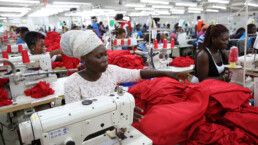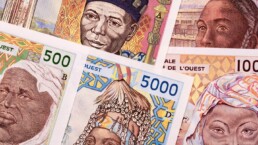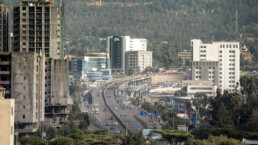Share
Are resources-backed infrastructure deals history?
China’s involvement on the African continent has rapidly increased since the early 2000s. Whereas various sectors have been covered, a strong focus, initially, had been set on large-scale infrastructure projects. This focus, however, is about to change, as China determines new priorities within the frame of its evolving relationship with Africa.
For over 15 years, China has largely invested in several billion infrastructure projects all over the African continent. Thereby, the mechanism of trading infrastructure for natural resources has widely been applied and became known as Resources-Backed Lending (RBL).
“China in Africa” has been a hot topic in western media for over a decade. Resources-backed lending, in particular, has often been portrayed as China’s primary focus on the African continent, as it became a popular narrative to depict China as a new oppressor and neo-colonialist to modern African governments. The media discussion’s main focus usually revolves around the question if target countries can avail from this alternative method of investment, or if “China” harms the development of economic growth on the continent by creating a new, unsolvable degree of dependence and debt. But can African governments actually benefit from the so-called “Angola model“? And how has Chinese interest in the African continent developed over time?
After the declared “China-Africa” year in 2006, the whole continent experienced a sharp increase in Chinese infrastructure investments. From close to zero Foreign Direct Investments in the early 2000s, China secured its rank as Africa’s number one trading partner already in 2009, leaving behind the US, France, and other significant players on the market.
What is RBL?
Foreign Direct Investments to most African countries are generally exposed to greater political and economic risks, compared to many other Chinese target regions in the world. In order to mitigate the apparently more significant risk, natural resources, such as crude oil, coltan, or bauxite are deployed as collateral within the frame of RBL.
Between 2004 and 2018, Chinese companies have invested in 52 resource-backed loans, of which almost 60% took place in sub-Saharan Africa. Notably, only 1 of the 52 deals had been made open to the public, which, consequently, leaves plenty room for speculation and conspiracy theories.
Fact is, however, that RBL comes with several advantages for both sides, including improved access to cheaper financing for the establishment of crucial multi-billion infrastructure all over the continent and faster implementation of the projects on site. Since Chinese investments are usually not tied to particular governance conditions or other requirements that interfere with the target country’s sovereignty as a state, it can be argued that more regions and people would gain access to crucial infrastructure, hospitals, and schools. Moreover, Chinese consortia could convince with significantly cheaper offers during international tenders, where evaluation processes are usually non-transparent and not open to the public.
On the other hand, however, the same argument is used against the mechanism, as most loans to date have been received by countries with a low RGI score, evaluating the quality of governance in selected sectors. RBL is thereby often carried out off-budget, without commitments on how the money shall be deployed.
Furthermore, loans that appear to be cheaper at first, might in reality turn out to be more expensive if commodity prices decrease.
While China’s government has always marketed RBL as an opportunity and “win-win” situation for its partner countries and itself, critics have expressed their concerns that these deals would contribute significantly to serious debt issues, walking straight into an alleged debt trap with no return. Even if this theory is backed up by the commodity price crash in the mid-2010s, which affected many RBL beneficiaries harshly, it is also becoming apparent that China has acted relatively flexibly in terms of repayment models.
New Priorities
Whereas RBL in Africa has definitely been a major concern of Chinese companies for several years, African resources play a less significant role to power the Chinese economy than often pictured, considering that China can “shop” anywhere along with its Belt and Road initiative.
Besides investing in additional sectors, including manufacturing and technology, the political and military engagement on the continent is also expanding. One milestone in this development is opening the first Chinese military base on the continent in Djibouti in 2017.
Within the frame of its growing political and technological impact on the continent, a very heated debate evolved around the topic of “New IP”, an alternative to the internet network, backed by Huawei. A Financial Times article from March 2020 has sharply criticized the concept and accused China of defining its governance model, leading to a “more centralized, top-down control of the internet. According to the authors, China might misuse the network to provide a platform to oppressive governments to regulate the use of data and its population’s surf behavior in general.
On their website, Huawei aims at presenting a more positive picture of the concept and tries “to clarify misunderstandings of what New IP entails as well as an outline for our future partners on why and how to engage with us on this endeavor. “According to Huawei, the main goal was to create a network that can keep up with the fast development of devices and the growing worldwide demand.
Even if this particular technology does not pose a direct threat to young democracies on the continent and if the picture of naively giving away African consumers’ data for China to usurp world domination is greatly exaggerated, there is truth in China’s dependency on data and political votes.
Whereas China only marginally depends on African natural resources, it greatly depends on the backup of as many countries and votes as possible when accomplishing its interests within international organizations.
By positioning high-level Chinese legislators in multilateral institutions, the Chinese government is undoubtedly interested in restructuring policy frameworks in their favor to extend its global superpower. The conceivable votes of 54 African countries can play a vital role in expanding Chinese influence and power across UN agencies.
Recommendation
With recent RBL deals endorsed in Guinea and Ghana and various others under debate, RBL will continue to exist in Africa and other parts of the world, though the focus of Chinese investments on the continent is shifting and shall be acknowledged by African policy makers post COVID-19. An increase of scrutiny concerning resources-backed loans and other FDI in general is indispensable. Besides defining clear and transparent terms of reference by the engaged Ministry of Finances, the flexibility of repayments should be secured in any contract. Furthermore, beneficiaries shall focus on diversifying their international partners to overcome dependency and avoid the vicious circle of debt-trap. It will be reasonable to obtain higher quality and cost-efficient offers by launching competitive and appropriate international tender frameworks.
Moreover, it will be beneficial to develop a guideline on how the recently obtained political capital can be employed to shape questionable conditions in favor of Africa. If receiving governments supra-national African organizations are able to develop a clear China-strategy (applicable to all international partners), the great power of political capital will soon be visible, empowering African governments to set their own conditions.
The views expressed in this article are those of the author alone and not the Future Africa Forum.
The views expressed in this article are those of the author and do not necessarily reflect the views of Future Africa Forum. Future Africa Forum is a pan-African policy think-tank and policy advisory consultancy headquartered in Nairobi, Kenya.



